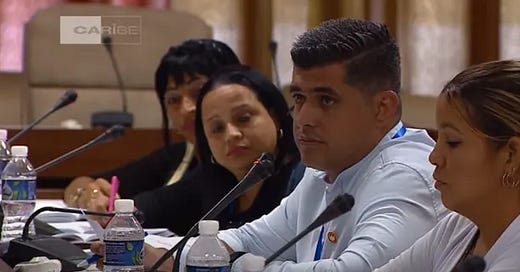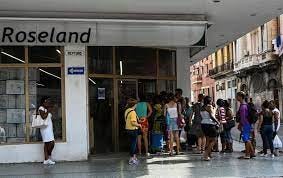In Cuba, a piece of Gouda cheese costs a state worker’s monthly salary, legislator says
“We are already very tired of programs, measures, studies, diagnoses. And where is reality? And where is the solution to the problem?” he added, visibly exasperated.
In an unprecedented moment that underlines Cuba’s spiraling economic crisis, a member of the island’s National Assembly, who is also the only business owner in the legislature, defended free markets during a session in which he also criticized the island’s socialist economic model.
Pointing out the inability of the centrally planned economy to provide enough food for all Cubans, Carlos Miguel Pérez said a state worker’s monthly salary is so low it’s worth about the price of a piece of Gouda cheese.
The remarkably candid address came during a session of the assembly last week in which Cuba’s dismal economy, its leaders’ tenacious defense of a failed system and the divisions at the top all spilled out in public.
“There is no Gouda cheese that costs less than what a state worker is paid in a month,” about 4,000 Cuban pesos ($20), said Pérez, who added that at age 37 he does not “remember a moment in which the salary in Cuba played the role of satisfying 100 percent the needs of our people.”
His words to his fellow assembly members marked a striking moment in the assembly, not only because they happened in a highly controlled environment but also because he is the first small business owner to have a seat in the island’s legislature.
A state television channel that was carrying the session live cut away abruptly to a newscast while Pérez was speaking. The TV anchors later said the newscast had been planned for that time, and added the station would replay Pérez’s comments in full because of audience “interest.”
The video shows Perez’s assembly colleagues sitting next to him, at times nodding at his comments but mostly trying to look straight ahead or listening with a blank expression.
Like other members of the National Assembly, who are carefully vetted to ensure loyalty to the Communist Party and the country’s leaders, Pérez, a founder and CEO of the software developing company Dofleini, is himself a party member. His company has benefited from his relationship with state agencies and officials, becoming the first authorized “PYME” — Cuba’s acronym for small and medium-sized businesses — under new regulations issued in 2021.
His presence in the National Assembly likely reflects the intent of some government officials to provide legitimacy to the new private businesses. But their rapid growth, even under tough state regulations, has also unnerved other factions within the government and the Communist Party who distrust market reforms. Some officials in charge of economic policies have made the growing private sector a scapegoat, blaming it for the skyrocketing inflation that followed a failed currency unification and a profound fall in productivity.
Amid those tensions, during one of the National Assembly sessions held last week, Pérez, who represents the Playa area of Havana, launched an extraordinary 15-minute defense of the private sector and free markets, calling for access to financing and fewer government controls.
“Do you want a PYME to produce food? Well, give it a loan, create tax benefits, and create economic mechanisms,” he said, adding that the country’s centrally controlled economy can’t compete. “Administrative mechanisms cannot be how we direct the economy because the economy has its own laws.”
Private businesses are becoming an important part of the Cuban economy. The island’s economy minister recently told the assembly that private enterprises are in line to import goods valued at $1 billion this year — outpacing the government itself. And some economists on the island estimate the private sector, which includes the PYMEs, self-employed workers and some cooperatives, now employs more workers than the state.
Pérez told his fellow assembly members that most private enterprises are resorting to loans from family members abroad, foreign companies doing business in Cuba and companies abroad that charge “20 to 30 percent commissions” that are being reflected in the prices of consumer products sold to the population.
The higher prices are not “a coincidence,” he said. ”It happens because we do not have access to foreign currency in any way.”
Pérez said calls to limit the number of private enterprises that can buy goods abroad and sell them in the country “a bad idea,” and pushed back against those accusing the private sector of engaging in price speculation and other illegal business activities.
“We cannot stigmatize them and say that this what the PYMEs do in Cuba,” he said, urging officials to treat possible violations on a case-by-case basis. He warned that such broad claims would create a negative public opinion climate that could influence decision-making at the highest levels of government.
But his words mostly fell flat on government officials’ ears, who instead pledged increased scrutiny of private businesses and punishment for “illegalities.”
The ambivalent attitude toward private enterprises was on display during the sessions last week, where officials briefing the National Assembly on the state of the economy acknowledged that without private businesses, which have become major importers of food and other essentials, it wouldn’t have been possible to keep up bread production in the country. But at the same time, they called for heavy-handed measures to cap the prices of goods imported by private enterprises and limit their number.
How Miami companies are secretly fueling the dramatic growth of Cuba’s private businesses
Confirming earlier reporting by the Miami Herald, a high-ranking Economy Ministry official also complained that the money flowing to the private sector is not going through government banks.
“There are distortions with a marked tendency towards dollarization and, in the case of non-state actors in the economy, withholding foreign currency abroad to pay suppliers, without going through the national banking system,” said Vice Minister Leticia Morales González.
At the same time, the calamitous state of Cuba’s economy that officials portrayed during the National Assembly session might mean Cuban authorities will have to keep tolerating some private activity.
Inflation has grown 45% this year, tourism has not recovered from its pre-pandemic levels, and exports are down to 35% of what was expected so far this year, Economy Minister Alejandro Gil told lawmakers. The economy barely grew 1.8% last year, he added, which barely makes a dent in the 10 percent contraction the country suffered during 2020, the first year of the COVID-19 pandemic.
Government officials have primarily blamed the economic crisis on the decades-old U.S. embargo and the pandemic. But the lack of productivity across the economy has become so evident that several members of the assembly and even high-ranking officials referred to the country’s inefficiencies during the assembly’s televised sessions.
Agricultural production has plummeted to the point that most of the food consumed by Cubans has to be imported, National Assembly President Esteban Lazo said.
“Today, the country does not have the resources to keep up with the level of imports we have,” Lazo said. “Practically 100% of the family food basket is being imported.... We are not producing rice; 100% of the beans are being imported. The country has no money, and where is the national production?”
“We are already very tired of programs, measures, studies, diagnoses. And where is reality? And where is the solution to the problem?” he added, visibly exasperated.
Several members of the assembly argued that price caps, the lack of fertilizers, fuel, access to financing and government control over distribution are at the root of the food crisis. But little was said during the debates suggesting authorities are considering widening market reforms to liberalize agricultural production.
Still, the fact that the growth of the private sector is currently at the center of discussions at top government levels and creating internal divisions slipped even into the closing speech to the assembly by Cuba’s handpicked president, Miguel Díaz-Canel.
In a speech accusing the “enemies of the revolution” of trying to magnify the current crisis, he said his government had been the center of attacks from “the extremes: from the right calling to privatize everything and to change the system, and also from a supposed left demonizing any space for the market.”
Go paid at the $5 a month level, and we will send you both the PDF and e-Pub versions of “Government” - The Biggest Scam in History… Exposed! and a coupon code for 10% off anything in the Government-Scam.com/Store.
Go paid at the $50 a year level, and we will send you a free paperback edition of Etienne’s book “Government” - The Biggest Scam in History… Exposed! AND a 64GB Liberator flash drive if you live in the US. If you are international, we will give you a $10 credit towards shipping if you agree to pay the remainder.
Support us at the $250 Founding Member Level and get an Everything Bundle – The Sampler of Liberty! - Get it free by going paid as a Founding Member!
Give me Liberty... and give me more! The Everything Bundle includes the latest version of our flagship book on government, along with a collection of potentially life-altering introductions to voluntaryism, agorism and peaceful anarchy.
“Government” – The Biggest Scam in History… Exposed! by Etienne de la Boetie2
Anarchy Exposed! - A former police officer reports on his investigative journeyby Shepard the Voluntaryist and Larken Rose
The Most Dangerous Superstition by Larken Rose
Sedition, Subversion and Sabotage – Field Manual #1 by Ben Stone, The Bad Quaker, and Ken Yamarashi
What Anarchy Isn’t– A short pamphlet by Larken Rose… The perfect introduction to peaceful anarchy
Three Friends Free – A Children’s Story of Voluntaryism
The Liberator is a 64GB wafer flash drive filled with books, documentaries, podcasts, MP3s, short videos, and music from the truth movement’s leading artists. The credit card-sized format makes it convenient to keep in your wallet to share and copy easily.










